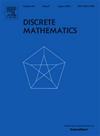Linear colouring of binomial random graphs
IF 0.7
3区 数学
Q2 MATHEMATICS
引用次数: 0
Abstract
We investigate the linear chromatic number of the binomial random graph on n vertices in which each edge appears independently with probability . For a graph G, is defined as the smallest k such that G admits a k-colouring with the property that every path P in G receives a colour which appears on only one vertex of P. For dense random graphs ( as ), we show that asymptotically almost surely . Understanding the order of the linear chromatic number for subcritical random graphs () and critical ones () is relatively easy. However, supercritical sparse random graphs ( for some constant ) remain to be investigated.
二项式随机图形的线性着色
我们研究了 n 个顶点上的二项式随机图 G(n,p)的线性色度数 χlin(G(n,p)),其中每条边都以 p=p(n) 的概率独立出现。对于一个图 G,χlin(G) 被定义为最小的 k,使得 G 可以接受 k-着色,其特性是 G 中的每条路径 P 得到的颜色只出现在 P 的一个顶点上。对于密集随机图(np→∞ 为 n→∞),我们证明了渐近几乎肯定 χlin(G(n,p))≥n(1-O((np)-1/2))=n(1-o(1))。理解亚临界随机图(np<1)和临界随机图(np=1)的线性色度数阶相对容易。然而,超临界稀疏随机图(np=c,对于某个常数 c>1)仍有待研究。
本文章由计算机程序翻译,如有差异,请以英文原文为准。
求助全文
约1分钟内获得全文
求助全文
来源期刊

Discrete Mathematics
数学-数学
CiteScore
1.50
自引率
12.50%
发文量
424
审稿时长
6 months
期刊介绍:
Discrete Mathematics provides a common forum for significant research in many areas of discrete mathematics and combinatorics. Among the fields covered by Discrete Mathematics are graph and hypergraph theory, enumeration, coding theory, block designs, the combinatorics of partially ordered sets, extremal set theory, matroid theory, algebraic combinatorics, discrete geometry, matrices, and discrete probability theory.
Items in the journal include research articles (Contributions or Notes, depending on length) and survey/expository articles (Perspectives). Efforts are made to process the submission of Notes (short articles) quickly. The Perspectives section features expository articles accessible to a broad audience that cast new light or present unifying points of view on well-known or insufficiently-known topics.
 求助内容:
求助内容: 应助结果提醒方式:
应助结果提醒方式:


